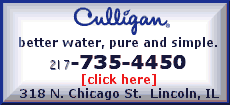|
The Partnership for a Drug-Free
Illinois is an initiative of Prevention First, the Illinois
affiliate for the Partnership for a Drug-Free America. The public
service announcements distributed to radio and television stations
statewide this week include messages about prescription and
over-the-counter drug abuse, methamphetamines, heroin, steroids, and
inhalants. The announcements also provide parents with suggestions
for how to talk to their teenagers about drug issues. "Parents are
the most important influences on youth behavior, and we want to help
them stay on top of the dangers that face their kids today," said
Adams. "Through constant media exposure and repeated anti-drug
messages, we're sharing strategies for preventing alcohol, tobacco
and other drug use. Our efforts have the most impact when media
messages are combined with home, school and community involvement."

The two Bartlett High school students overdosed on cold pills and
were treated at a local hospital. The incident was an example of a
growing concern over prescription and over-the-counter medicine
abuse among young people.
The Illinois Department of Human Services administers the state's
substance-abuse prevention programs and funds Prevention First, a
comprehensive drug prevention organization assisting professionals
and communities through training in effective drug prevention
practices, library and research services, free prevention materials,
and anti-drug public awareness campaigns.
"The media is the most effective way for us to reach parents with
up-to-date information about what drugs their kids are being exposed
to today," said Karel Ares, executive director of Prevention First.
"Our goal is to prevent teens from first trying drugs, which is one
of the most effective ways to reduce overall drug use in our
communities."

According to statistics compiled by the Partnership for a Drug
Free America:
-
Four of 10 high
school students have used alcohol or other drugs in the past
month. Nearly one in five teens (19 percent, or 4.5 million)
report abusing prescription medications to get high.
-
Nearly one-third of
teens (31 percent, or 7.3 million) believe there's "nothing
wrong" with using prescription medicines without a prescription
"once in a while."
-
One in 10 (10
percent, or 2.4 million) report abusing cough medicine to get
high.
[to top of second column]
 |
 "Educating parents is crucial to helping prevent drug abuse and
intervene with those who may have a drug addiction problem," said
Adams. "Kids who learn a lot about the risks of drugs from their
parents are up to 50 percent less likely to use drugs."
Prevention First works with local media to generate and sustain
high-quality donated advertising time and space for anti-drug
messages from the Partnership for a Drug-Free Illinois on TV and
radio, in newspapers, and in other outlets that reach parents and
teens in the community.
Prevention First works with community leaders, business and
government organizations -- both state and local -- and other
nonprofits to provide resources for local programs and events and
raise public awareness to reduce illicit drug use.

The Partnership for a Drug-Free America is a nonprofit coalition
of communication, health, medical and educational professionals
working to reduce illicit drug use and help people live healthy,
drug-free lives.
The partnership's research-based, educational campaigns are
disseminated through all forms of media, including TV, radio and
print advertisements and over the Internet. In its 18-year history,
the partnership has utilized the pro bono work of the country's best
advertising, public relations and interactive agencies, and the
donated time and space of major media, to create the largest public
service campaign in the nation's history.
Last year, the Partnership for a Drug-Free America, with support
from the Consumer Healthcare Products Association and its member
companies, launched the first national prescription and
over-the-counter medicine abuse education campaign.
The campaign, released in both English and Spanish, speaks
directly to parents by alerting them that their own homes are easily
accessible sources for teens to obtain and abuse these medications.
The campaign is comprised of hard-hitting television, newspaper,
magazine and radio messages; a comprehensive online component; and
is supplemented by informational brochures to help parents get the
conversation started with their teens. The campaign also includes a
multifaceted public relations effort.
[Text from Illinois
Department of Human Services news release received from
the
Illinois Office of
Communication and Information]

 |